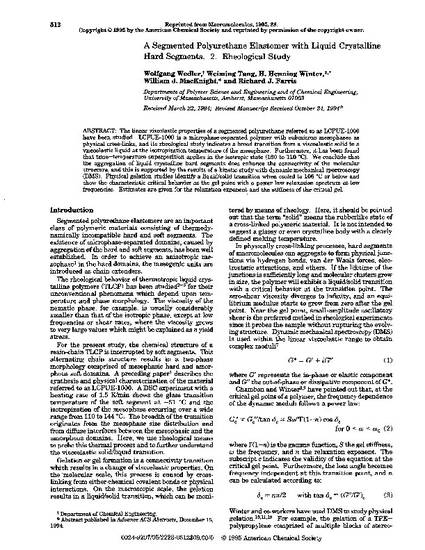
Article
A Segmented Polyurethane Elastomer with Liquid Crystalline Hard Segments 2. Rheological Study
Macromolecules
(1995)
Abstract
The linear viscolastic properties of a segmented polyurethane referred to as LCPUE-1000 have been studied. LCPUE-1000 is a microphase-separated polymer with submicron mesophases as physical cross-links, and its rheological study indicates a broad transition from a viscoelastic solid to a viscoelastic liquid at the isotropization temperature of the mesophase. Furthermore, it has been found that time-temperature superposition applies in the isotropic state (160 to 110 °C). We conclude that the aggregation of liquid crystalline hard segments does enhance the connectivity of the molecular structure, and this is supported by the results of a kinetic study with dynamic mechanical spectroscopy (DMS). Physical gelation studies identify a liquid/solid transition when cooled to 106 °C or below and show the characteristic critical behavior at the gel point with a power law relaxation spectrum at low frequencies. Estimates are given for the relaxation exponent and the stiffness of the critical gel.
Keywords
- Segmented,
- Polyurethane,
- Elastonomer,
- Liquid Crystalline,
- Hard Segments,
- Rheological Study
Disciplines
Publication Date
1995
Citation Information
William MacKnight, Wolfgang Wedler, Weiming Tang, H. Henning Winter, et al.. "A Segmented Polyurethane Elastomer with Liquid Crystalline Hard Segments 2. Rheological Study" Macromolecules Vol. 28 (1995) p. 512 - 516 Available at: http://works.bepress.com/william_macknight/199/
